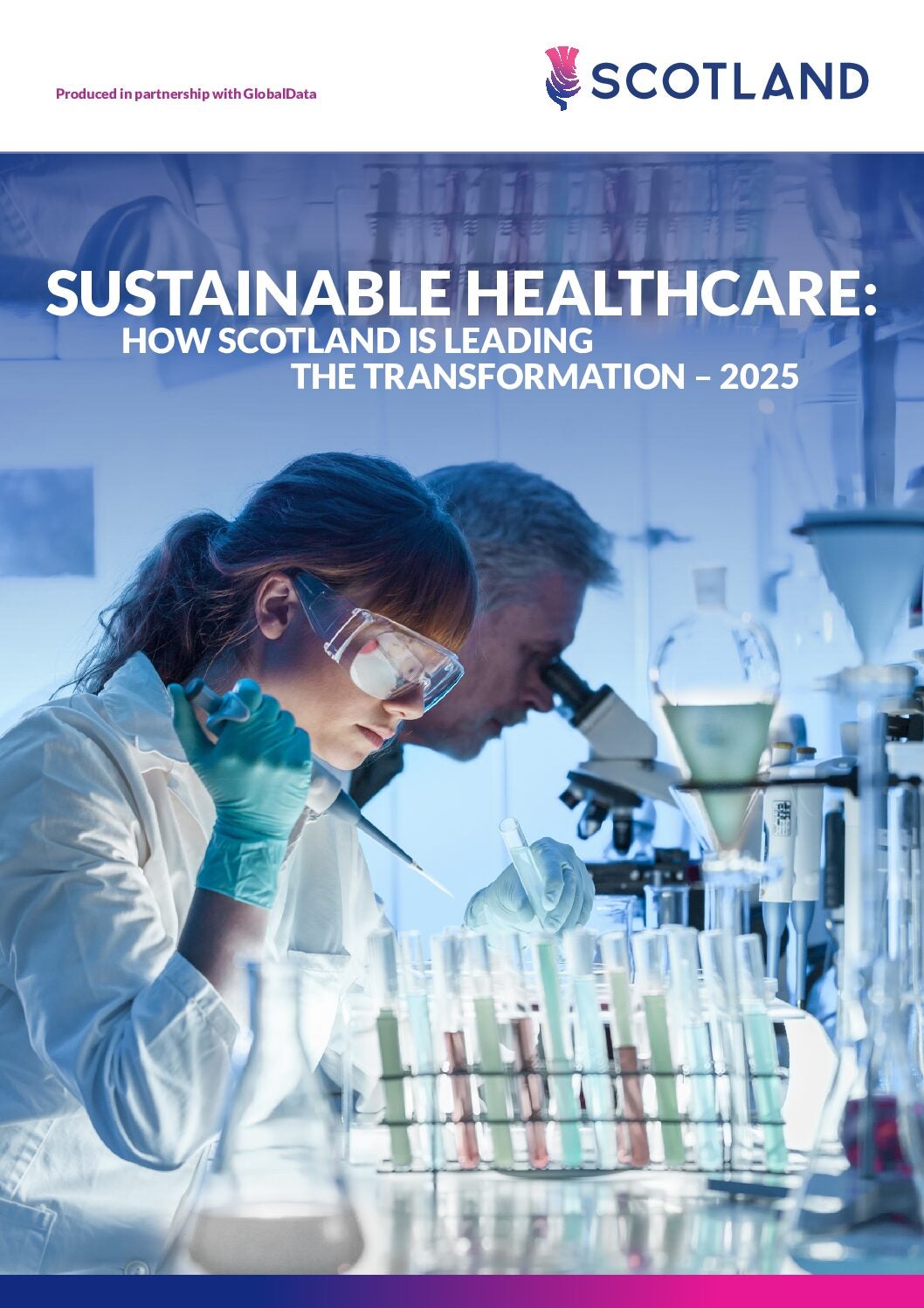
With diabetes diagnoses growing globally, remote monitoring technologies developed in Scotland are now providing essential solutions for managing the condition.
The increasing number of people with diabetes is placing a strain on day-to-day lifestyles, families, and healthcare services. Estimates from the International Diabetes Federation’s (IDF) Diabetes Atlas (2025) suggest that one in nine adults aged between 20 and 79 years has the condition. Within this, a projected four out of ten people do not realise they have diabetes.
The projected picture becomes worse by 2050, when the foundation predicts that adult diabetes cases will increase to one in eight of the global population, amounting to 853 million people – a 46% rise from 2025.
Diabetes is commonly connected to other health issues, ranging from foot problems to more serious implications such as blindness, and the increased risk of a heart attack, kidney failure, a stroke, or developing dementia. Therefore, it is vital to monitor conditions before they worsen.
A key aspect of the UK Government’s ten-year health plan is transforming the way healthcare is delivered, moving care away from hospitals and into communities. At the centre of this strategy are digital technologies that enable more effective management of conditions and the implementation of preventative actions to treat patients earlier, with the aim of avoiding hospital admissions at later stages.
Data-driven technologies are a fundamental element of this strategy. Scotland is leading the way with solutions that are making significant improvements to the management of conditions such as diabetes.
Using remote monitoring technologies for diabetes management
Digital technologies can provide patients with greater visibility of key metrics such as blood sugar levels, weight, and blood pressure. When any early signs of concern are detected, alerts can be sent to the patient, a family member, or healthcare professionals.
MyWay Digital Health is a Scottish company that began developing solutions for diabetes before branching out to serve other medical conditions. The company was founded by Dr Debbie Wake, who is a specialist diabetes doctor in Scotland. Every day, Dr Wake sees people with diabetes and other linked conditions, as well as the challenges they live with.
The MyWay app provides patients with a practical way to manage their conditions, keeping track of multiple health levels. People can access their health data and link up remote monitoring information/ devices. Reminders can be sent to the patient when screening tests are due, or parameters are out of range, with personalised prompts, educational resources, courses and wider information also available.
“A lot of diabetes apps focus on just managing the sugar levels. That’s actually only a very small part of the issue,” explains Wake. “When we’re managing diabetes, we’re not just thinking about managing the sugar level. It’s managing the risk factors like blood pressure, cholesterol, looking into people’s physical and psychological health, screening their feet/ eyes, and supporting wider self-management/ lifestyle factors including weight management where relevant.”
Complications from diabetes such as kidney failure or heart attacks can be extremely serious for patients and have huge costs for health services. However, sufficient levels of monitoring and management can enable early interventions to avoid the worst outcomes.
“A big focus for us is preventative healthcare,” adds Wake.
Developing an app to manage diabetes in Scotland
The MyWay platform has its origins almost 20 years ago and was one of the first health apps, beginning as a website with resources available to learn more about diabetes. “It was a very forward-thinking approach in terms of joining up data for diabetes,” says Wake.
MyWay was developed through a national network set up to drive improvements in diabetes care through data and informatics elements. A national programme for diabetes was set up, with the initial focus on clinician management. A database for everyone registered with diabetes in Scotland was established, leading to an IT platform, allowing clinicians to analyse data and better coordinate treatments across primary and secondary care settings.
Based on the data-driven elements available, the MyWay app was created in the mid to late 2000s. Technical expertise was led by Scott Cunningham through the University of Dundee, with clinical aspects supported by Dr Wake.
The initial version of the app in Scotland was developed and delivered non-commercially under a contract funded by the Scottish Government and administered by the University of Dundee. MyWay (MWDH) is now deploying similar services outside of Scotland through commercial routes, being supported by funding from Innovate UK, the National Institute for Health and Care Research (NIHR), and Scottish Enterprise.
“We started to grow the system and demonstrated impacts, which we presented through papers and conferences. It was clear there was an interest outside Scotland in being able to access a similar sort of system.”
Rolling out Scottish health apps to international markets
Considerable efforts went into turning MyWay into a commercial product. Eventually, the company spun out of the University of Dundee, with IP developed in Scotland used to help manage diabetes for patients in other countries. NHS England was an early adopter to take advantage of the capabilities. MyWay is now involved in international projects, with a current focus on the Middle East.
There have been significant challenges with setting up the MyWay service in other countries. The many years of integrated diabetes data accumulated and accessible in Scotland are often absent in other locations. Moving to new environments that may lack the necessary data infrastructure means teams almost need to start from scratch to build and integrate data.
“That always takes quite a long time in any new environment. But once we’ve done that foundation work, then that’s very valuable for us being able to put the various applications on top,” adds Wake.
The same data-driven approach has since been widened and applied to other chronic diseases. The link between diabetes and other health issues made it easier to use the data and functionality in the MyWay platform to be adapted to treat other conditions. For example, with obesity a main cause of type 2 diabetes, the weight management capabilities were already available in the app and just required some tweaking for a broader population.
MyWay also offers monitoring solutions for conditions such as cardiovascular disease (CVD) and CVD risk management and pre-diabetes/ diabetes prevention. Furthermore, the app has started to incorporate aspects of machine learning to predict the future risk of a patient’s condition worsening and their likely response to drugs and aids in diagnosis and subtyping.
“Our systems have changed a lot over time. We’ve developed more and more additional functionality,” says Wake. “For example, we’re now able to show people their risk of complications. But more importantly, how they can reduce that so they can see the impact of losing weight, increasing activity, or stopping smoking.”
Crucially, patients have been able to manage their data and benefit from advice through the platform since its inception.
Support for healthtech startups
The Scottish healthtech ecosystem has a strong track record of developing innovative companies in areas such as remote monitoring to achieve international recognition, as MyWay has. Founded in Scotland, PneumoWave provides devices that measure chest movements for patients at risk of sudden death from conditions such as opioid addiction or epilepsy. The company now has two offices in the US.
At the centre of health innovation in Scotland is the triple helix of collaboration between industry, government, and academia. “That triple helix is a really important component of how we take these technologies to benefit not just Scottish patients to drive economic growth, but also to be able to access worldwide market,” says Dr David Lowe, clinical lead for health innovation with the Scottish Government. At the University of Glasgow, he is also clinical director for innovation of the Digital Health Validation Lab.
Scotland’s relatively small size but high level of expertise offers a highly efficient test bed to develop health innovations across diverse environments – from cities to remote communities. The country’s regional innovation hubs are central to driving advances.
In Scotland, start-ups have the opportunity for entrepreneurial exposure and working alongside industry experts. Teams can gain an understanding of the business aspects of their projects, further their learning and qualifications, while also benefiting from insights provided by health practises and clinicians.
“We’re probably about the right size in terms of population-based access to data, the ability through the regional innovation hubs to be able to deploy these solutions and gather evidence, leveraging the strength of higher education institutes, clinical trial units, and health economics,” adds Lowe.
Underpinning all these strengths is the support from governments, funding, and programmes such as the AI accelerator through the University of Edinburgh, as well as Techscaler for startup development.
“Being based in Scotland has given us access to a huge amount of support, which you really just don’t get elsewhere,” adds Wake.
To learn more about the health ecosystem in Scotland, download the document below.





